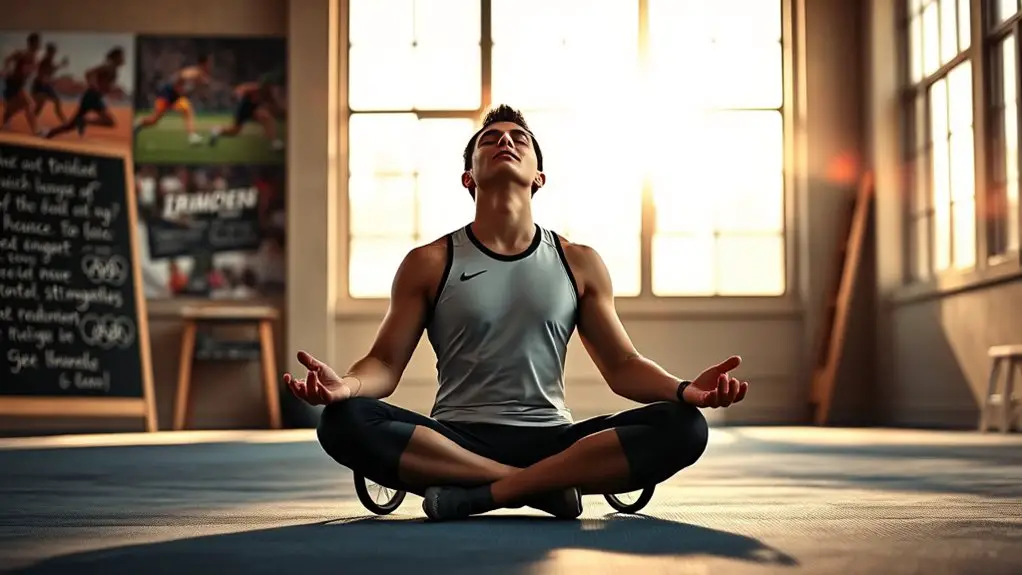Mental preparation is key during intense matches because it builds resilience and keeps you focused under pressure. Techniques like visualization help you mentally rehearse success, while mindfulness practices calm your nerves and enhance your concentration. Managing pre-game anxiety is essential, so developing a routine can set the stage for performance. By embracing failure as a learning opportunity, you cultivate a growth mindset. Want to discover more strategies to elevate your game? Keep exploring!
The Importance of Mental Resilience in Sports
Mental resilience is a key ingredient in the recipe for success in sports. It's what separates the good from the great when the pressure's on. You need mental toughness to push through challenges and stay focused on your goals. When adversity strikes, your emotional stability becomes essential. It's not just about physical skill; it's about how you handle the ups and downs.
Imagine being in a high-stakes match, and things aren't going your way. If you can stay calm and composed, you'll find that inner strength to bounce back. This resilience allows you to embrace freedom in your performance, letting your instincts take over rather than being bogged down by fear or doubt. Practicing mindfulness can enhance your ability to remain centered during these moments of pressure. Cultivating mental toughness and emotional stability can transform how you approach every match, giving you the confidence to release your potential and thrive under pressure. So, embrace the challenge and let your resilience shine!
Visualization Techniques for Enhanced Performance
Harnessing mental resilience sets the stage for powerful visualization techniques that can greatly enhance your performance. By employing guided imagery, you can create vivid mental scenarios where you see yourself succeeding. This technique allows your mind to rehearse actions and strategies, making them feel more familiar and attainable during actual matches.
Outcome visualization complements this by focusing on the end result you desire. Picture yourself achieving your goals, whether it's scoring a winning point or executing a perfect play. The clearer your mental image, the more likely your body will respond accordingly. Additionally, practicing visualization regularly can improve muscle memory and coordination, further enhancing your overall performance.
Here's a quick table comparing the two techniques:
| Technique | Purpose |
|---|---|
| Guided Imagery | Rehearse actions and strategies |
| Outcome Visualization | Focus on achieving desired results |
Incorporating these techniques into your routine not only boosts confidence but also aligns your mental state with your performance goals.
Mindfulness Practices to Stay Present
While intense matches can create pressure and distractions, practicing mindfulness helps you stay present and focused. One effective technique is mindful breathing. By concentrating on your breath, you can anchor yourself in the present moment, letting go of worries about the outcome or past mistakes. Take a deep breath in, hold it for a moment, then exhale slowly. This simple practice not only calms your mind but also sharpens your awareness of the game. Additionally, mindfulness enhances focus and reduces anxiety, allowing you to perform at your peak under pressure.
You can also incorporate brief mindfulness breaks during matches. Whenever you feel overwhelmed, take a second to refocus on your body and surroundings. Notice the sounds, the sensations, and the energy around you. This awareness can help you regain control and clarity.
Managing Pre-Game Anxiety
Before the game, it's natural to feel anxious, but you can manage that anxiety effectively. Breathing techniques, visualization, and positive self-talk can all help you stay focused and calm. Let's explore how these strategies can enhance your performance and ease your mind. Additionally, developing a pre-kick routine can significantly enhance your focus and reduce anxiety during high-pressure moments.
Breathing Techniques for Calmness
As you prepare for an intense match, incorporating effective breathing techniques can considerably reduce pre-game anxiety. Focus on breath control; it's your ally in achieving calmness. Start by finding a quiet space where you can center yourself. Inhale deeply through your nose for a count of four, hold for four, then exhale slowly through your mouth for six. Repeat this cycle several times. This calming technique not only helps clear your mind but also stabilizes your heart rate, allowing you to feel more present and less overwhelmed. Remember, controlling your breath empowers you to take charge of your emotions. Embrace this freedom, and let your breath guide you toward a focused, confident mindset as you head into the match.
Visualization for Performance Boost
How can visualization transform your pre-game anxiety into a powerful performance tool? By harnessing the power of mental imagery, you can create a vibrant mental rehearsal that calms your nerves and sharpens your focus. Picture yourself executing perfect plays, feeling the rush of adrenaline, and basking in the thrill of success. This isn't just daydreaming; it's a technique for performance enhancement that primes your mind and body for the challenge ahead. When anxiety creeps in, close your eyes and visualize overcoming obstacles and achieving your goals. This practice not only alleviates tension but also builds confidence, allowing you to step onto the field or court with a sense of freedom and assurance. Embrace visualization and watch your performance soar!
Positive Self-Talk Strategies
While preparing for an intense match, the words you tell yourself can make a significant difference in managing pre-game anxiety. Positive self-talk isn't just a feel-good tactic; it's a powerful tool. Using affirmation techniques, remind yourself of your strengths and past successes. Say things like, "I'm ready," or "I've trained hard for this." These phrases can shift your mindset from doubt to confidence. Explore self-encouragement methods too—focus on what you can control, like your effort and attitude. Instead of worrying about the outcome, tell yourself to embrace the challenge. By creating a dialogue that uplifts, you'll find a sense of freedom in the moment, allowing you to perform at your best when it counts.
Developing a Strong Pre-Match Routine
To guarantee you're mentally prepared for intense matches, developing a strong pre-match routine is essential. A consistent routine helps solidify your focus and boost your confidence. Think about incorporating various pre-match rituals that resonate with you, as these can serve as effective mental conditioning tools.
Here's a simple table to help you structure your routine:
| Time Before Match | Activity | Purpose |
|---|---|---|
| 1 Hour | Visualization | Picture your success |
| 30 Minutes | Light Stretching | Release tension |
| 10 Minutes | Breathing Exercises | Center your mind |
Additionally, incorporating mindfulness techniques into your routine can provide freedom in performance and help combat competition anxiety.
The Role of Positive Self-Talk
Positive self-talk acts as a powerful tool in your mental preparation for intense matches. When you harness the power of positivity, you can elevate your performance and boost your confidence. Here are some effective affirmation techniques and self-encouragement practices to integrate into your routine:
- Daily Affirmations: Start each day by repeating positive statements about your abilities and goals.
- Visualize Success: Picture yourself succeeding in your matches, reinforcing your belief in your skills.
- Challenge Negative Thoughts: When self-doubt creeps in, counter it with evidence of your past successes.
- Set Intentions: Before a match, declare your intention to play with focus and determination. Engaging in positive self-talk enhances performance and boosts confidence.
Strategies for Focus and Concentration
Building on the foundation of positive self-talk, maintaining focus and concentration during intense matches is essential for peak performance. To elevate your game, try implementing focus techniques that keep distractions at bay. For instance, practice mindfulness; it helps you stay present and engaged, allowing you to react instinctively to the action unfolding around you.
Incorporate concentration drills into your routine. Simple exercises, like visualizing your goals or breaking down complex plays into manageable steps, can sharpen your mental acuity. You might also find it helpful to set specific, achievable targets during training sessions, reinforcing your ability to concentrate under pressure.
Lastly, take breaks to reset your mind. Just a few moments of deep breathing can clear mental clutter, enhancing your focus when it counts. Embrace these strategies, and you'll find your concentration sharpening, giving you the freedom to play your best when it matters most. Additionally, integrating meditation techniques can further enhance your ability to maintain focus and reduce anxiety during critical moments in competition.
Coping With High-Pressure Situations
While every athlete faces high-pressure situations, how you cope with them can greatly impact your performance. Effective pressure management and emotional regulation are key to thriving when the stakes are high. Here are four strategies to help you navigate those tense moments:
- Breathe Deeply: Taking slow, deep breaths can calm your mind and body, allowing you to focus on what matters.
- Visualize Success: Picture yourself excelling in your performance. This positive imagery can boost your confidence and reduce anxiety.
- Set Micro-Goals: Break down your performance into smaller, manageable tasks. This makes high-pressure scenarios feel less overwhelming.
- Stay Present: Concentrate on the moment rather than the outcome. Being present keeps your mind clear and focused.
- Incorporating mindfulness techniques into your routine can further enhance your ability to handle stress effectively.
Learning From Failure and Bouncing Back
High-pressure situations can lead to unexpected outcomes, and failure is often a part of the journey for any athlete. Embracing failure isn't just about accepting it; it's about conducting a thorough failure analysis. This process helps you pinpoint what went wrong and discover valuable lessons hidden in setbacks. Instead of dwelling on disappointment, shift your focus to resilience building.
Each failure is a stepping stone, not a stumbling block. When you learn to bounce back, you cultivate a mindset that sees opportunities where others see defeat. This newfound strength fuels your passion and determination, reminding you that every setback can propel you forward. By facing your failures head-on, you're not just growing as an athlete; you're embracing the freedom to evolve and improve. Remember, the journey's not just about winning; it's about how you rise every time you fall. Additionally, building resilience is crucial for transforming setbacks into stepping stones for future success.
Building Team Mentality and Support Systems
A strong team mentality can be the difference between victory and defeat, especially in intense matches. When you cultivate a supportive environment, your team can thrive under pressure. Here are some key aspects to foster that mentality:
A supportive team environment can transform pressure into triumph, making all the difference in crucial matches.
- Team Bonding: Engage in activities that strengthen relationships beyond the game.
- Communication Strategies: Develop open lines of communication to enhance trust building and conflict resolution.
- Accountability Partnerships: Pair up with teammates to hold each other accountable for shared goals, providing both motivation and emotional support.
- Positive Reinforcement: Celebrate small victories to build collective resilience and maintain morale.
Frequently Asked Questions
How Can Mental Preparation Improve Physical Performance During Matches?
Mental preparation can greatly improve your physical performance during matches. By using visualization techniques, you can mentally rehearse your actions, making them feel more instinctive on the field. This practice enhances your focus, allowing you to block out distractions and stay in the moment. When you're fully engaged, your body responds better, and your skills shine through. It's about finding that freedom to perform without mental barriers holding you back.
What Role Does Nutrition Play in Mental Readiness for Sports?
Nourishing your body with the right nutrition is essential for your mental readiness. Timing your meals can greatly impact your focus and energy levels, while smart hydration strategies keep your mind sharp. When you fuel yourself with balanced meals and stay hydrated, you're setting the stage for peak performance. So, embrace the freedom that comes with ideal nutrition; it's your secret weapon for staying sharp and agile, both mentally and physically.
Can Mental Coaching Be Beneficial for Non-Professional Athletes?
Absolutely, mental coaching can be highly beneficial for non-professional athletes. It helps you build mental resilience, allowing you to push through challenges and setbacks. By using visualization techniques, you can imagine successful performances, which can boost your confidence and focus. This kind of preparation not only enhances your athletic skills but also promotes a sense of freedom, helping you enjoy the journey and play without the pressure of expectations.
How Does Sleep Impact Mental Preparation and Performance?
They say, "You can't pour from an empty cup." Sleep quality is essential for your cognitive function and overall performance. When you skimp on sleep, your brain struggles to focus, make decisions, and process information. This makes it harder for you to think clearly and react quickly. Prioritizing rest not only sharpens your mind but also enhances your ability to tackle challenges, giving you the freedom to perform at your best.
What Are Common Misconceptions About Mental Toughness in Athletes?
When it comes to mental toughness in athletes, there're plenty of misconceptions floating around. One common myth debunking is that tough athletes never show emotion—this stereotype overlooks the importance of vulnerability and mental health. You might think toughness means grinding through pain, but real strength often involves knowing when to rest and recover. Embracing your feelings can lead to better performance, proving that being mentally tough isn't about being emotionless; it's about being resilient.




